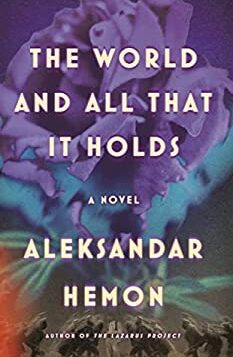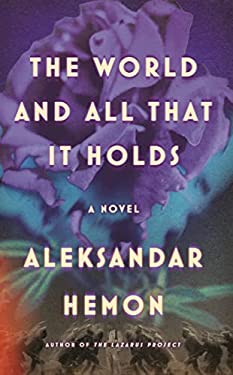FIFTY-EIGHT-YEAR-OLD Aleksandar Hemon believes in the transcendent power of an enduring passionate love to allow one to survive the world’s horrors and indignities. This belief is what drives his new novel, The World and All That It Holds. The story is relayed to us by a mysterious narrator, who speaks in a strange sort of haunting and old-fashioned prose. Hemon keeps our eyes glued to his two homosexual lovers throughout the narrative as they struggle to remain afloat in a world at war.
We quickly meet the unforgettable Rafael Pinto, a Bosnian Sephardic Jew who loves poetry and runs his father’s apothecary in Sarajevo while dreaming about the possibility of social justice. Pinto thinks to himself: “This was a century of progress; great things were coming our way. Remember the future!” Yet, things quickly go awry. He accidentally witnesses the assassination of Archduke Franz Ferdinand moments after an erotic encounter in his shop, when he had summoned the courage to kiss a man on the lips, leaving them both surprised. Pinto will never forget this day; 1914 was the beginning of decades of madness.
And then there is Osman, a Muslim orphan left to his own devices as a child. The narrator attempts to explain his innate charisma: “Osman was good as bread—bueno komu il pan—never angry, never whining, never smoking. An orphan, he used to scrape a living as a kid running errands for store owners in the Carsija, fetching the asce, coffee, and locum. The stingy, strict enfendijas taught him to read, paid him in books; the others teased him in every language they could speak; others made him do things no child should ever have done.”
Pinto and Osman are conscripted into the Austro-Hungarian army to fight the Russians. Their instant attraction makes time stop: “A candle’s light trembled on Osman’s face, ever smooth, even if there was never enough water for a proper shave. His moustache was always trimmed, as though he’d discovered a way to resist the undoing of something.” They are brought to Uzbekistan as prisoners of war and soon enough released and accidentally separated. Pinto is left with Osman’s infant daughter, the result of a one-night stand Osman thought could buy freedom for them both. Pinto takes the baby with him as he travels the world with hordes of refugees seeking shelter. Pinto knows he is expendable, as is Osman and the child, but remains resolute that they will find each other again. He often hears his lover’s voice in his head during times of duress, and thinks Osman is close by, but it is just the morphine talking.
As years pass, Pinto’s love for Osman doesn’t diminish but remains vivid in his memories. He likes to think back to their times together, such as when they would make love in their bunk beds, ever afraid the other soldiers would awaken and hear them. But their tug towards one another was irresistible and worth the risk: “Whatever world and imperial army surrounded them tonight receded into the long darkness, so Pinto could turn his face to Osman and open his mouth and receive his tongue.” Hemon has a magical touch that encompasses all aspects of what it means to be completely in love. He also explores what it means to stay in love through memory, which is a trickier proposition.
The book is in English but sprinkled with phrases in Spanish, German, Bosnian, and French. No translation is provided, but the mysteriousness of these sentences adds to the novel’s intrigue. As Pinto wanders into Shanghai with Osman’s daughter still in tow, there’s a sense of foreignness that’s amplified by these multilingual phrases. Pinto has grown weary, and his resentment is palpable as he considers the reality that is his life, and Osman’s, and the child’s. The unfairness of the cruelty inflicted upon them starts to fester inside.
Hemon has written about desolation before, as in his story “The Aquarium” about the loss of his infant daughter, which he described as an almost unthinkable agony that had the potential to destroy him. He has spoken in interviews about his tense relationship with his father. His parents fled Sarajevo for Canada before the siege, and Hemon escaped by being in the U.S. at the time of the Serbian militia attacks. He received political asylum. He lives in Chicago with his wife and daughters and claims it feels like home, despite the feeling of displacement that pervades his prose.
As a young man, he would struggle with anxiety, asking himself: “What if my reality was really someone else’s fiction? What if, I thought, I was the only one not seeing what the world was like? What if, I thought, I was the dead end of my perception?” He distracted himself as an adolescent with music and chess, but when he found writing, he channeled his enormous energy into it. In this dazzling new work, he allows us to bear witness to his emotional journey without feeling the compulsion to rely on distractions of any kind. ____________________________________________________
Elaine Margolin is a freelance writer based in New York City.







